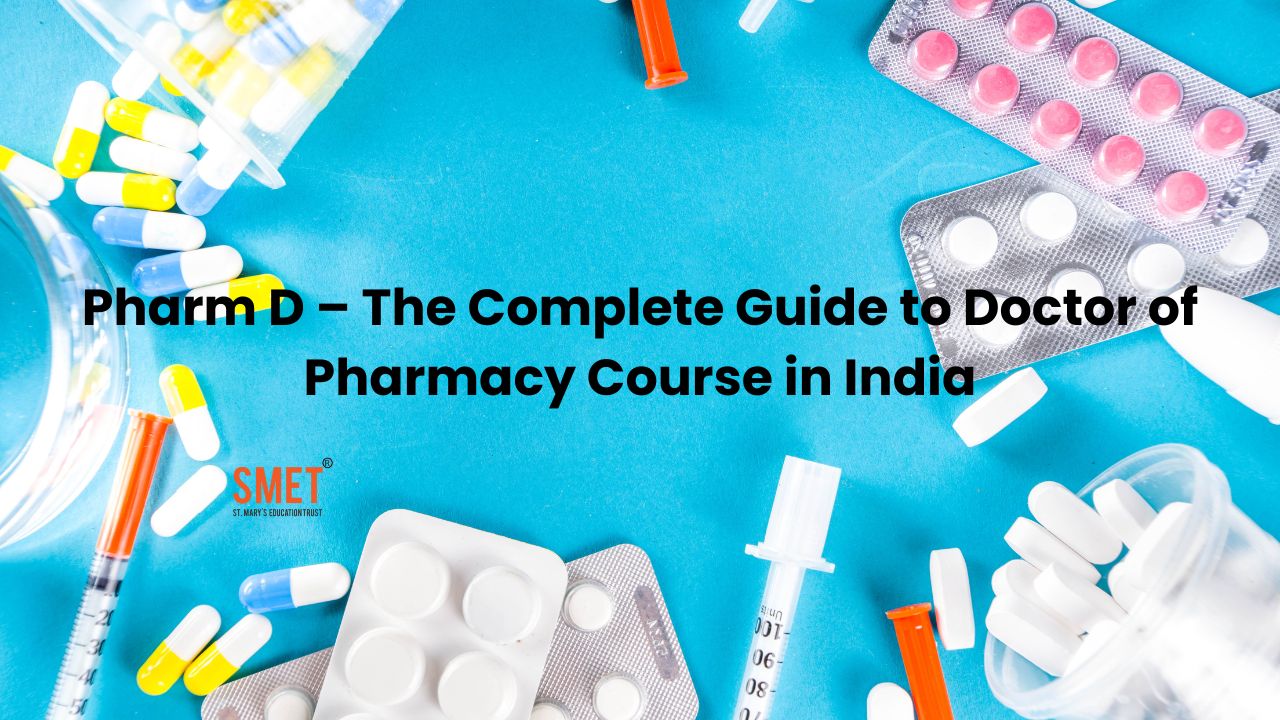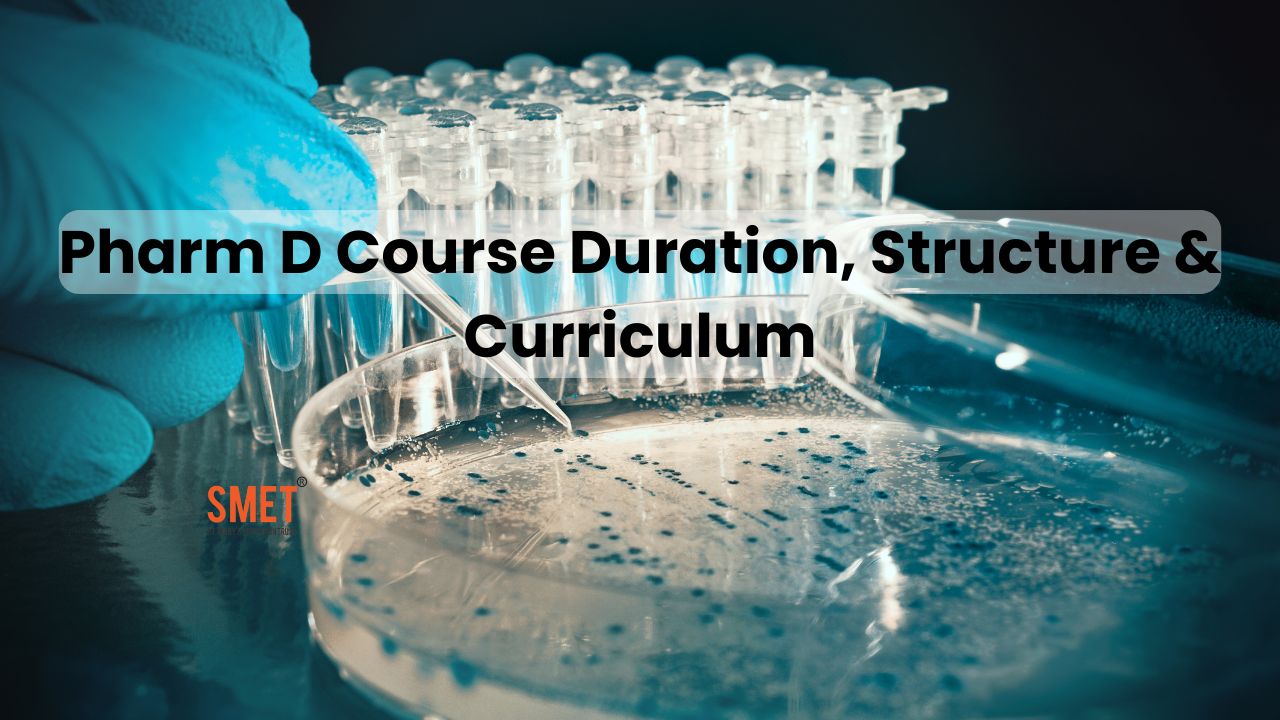Pharm D – The Complete Guide to Doctor of Pharmacy Course in India

Are you considering an opportunity in healthcare but aren’t sure which path will lead to real change and long-term success? A common question students have to answer is, “What do you mean by Pharm D, and is it worthwhile?” In today’s fast-changing medical field, Pharm D stands out as a high-paying, future-proof and highly sought-after career.
Pharm D (Doctor of Pharmacy) is a doctoral degree in clinical research. It is a program that focuses on the care of patients as well as medication therapy and real-time decision-making in hospitals and other healthcare situations. In contrast to B Pharma, which focuses on the formulation of drugs and pharmacy sciences, Pharm D is designed to prepare you for work directly with physicians, patients and play a crucial role in the outcomes of treatment. It belongs to the broader category of pharma-medical-courses, designed for students passionate about healthcare.
With the growing demand worldwide for clinical pharmacists with expertise, having a pharmacy degree is a pathway to a variety of positions in research centres, hospitals and healthcare systems across the world.
If you’re not sure how to begin, SMET Education Consultancy can assist. With many years of experience in aiding students to get into the top medical schools, SMET provides expert counselling as well as college selection help and admissions support for programs such as Pharm D, B Pharma, and D Pharma.
In this article, you’ll discover everything you need to know about Pharm D, From the eligibility criteria and fees to the best universities and career possibilities.
What is Pharm D?
The Pharm D, also known as Doctor of Pharmacy, is a professional doctorate program specifically designed for those who wish to be employed in the clinical or the patient-care aspect of pharmacy. In contrast to traditional pharmacy degrees, which focus on pharmaceutical science and drug manufacturing, The Pharm D program focuses on the use of drugs, patient safety, and direct interactions with healthcare professionals. This makes it a distinct pharma-medical-course highly relevant in today’s evolving health sector.
Full-Form: Doctor of Pharmacy Academic Level: Professional Doctorate Time of Course: Six years (5 years of academic studies + one year of clinical internship)Clinical and Industry Value
The Pharm D program prepares students for positions in clinics, hospitals and research institutions. With a focus on clinical work, students are taught how to manage drugs as well as monitor patient health, and avoid mistakes with medication. These skills are in high demand worldwide.
Whether it’s clinical research, hospital pharmacy or pharmacovigilance issues, having a Pharm D from India opens the door to a variety of lucrative careers that are able to be a part of the future.
Why Choose Pharm D Over Other Pharmacy Courses?
In the case of Pharm D in comparison to B Pharm, one big advantage for Doctor of Pharmacy is the direct exposure to the clinical. In contrast to traditional pharmacy degrees, Doctor of Pharmacy students are taught to collaborate closely with physicians and patients in real-world medical situations.
The worldwide significance of Pharm D is what makes this program a great choice for students who want to work overseas or in international research and hospital institutions. It also gives better access to research opportunities in clinical as well as hospital placements and positions in the field of advanced pharmacy.
One of the main Doctor of Pharmacy advantages is the potential for growth over the long term and career advancement and earning potential to B Pharm. If you’re seeking an enduring, patient-focused and internationally recognized pharmacy career, Doctor of Pharmacy is the better option.
Pharm D Course Duration, Structure & Curriculum

It is believed that the Pharm D length of the program is six years. It combines profound educational knowledge with practical education. The first five years focus on theoretical and practical education, covering subjects like human anatomy, pharmacology, clinical pharmacy, pharmacotherapeutics, hospital pharmacy, and pharmaceutical jurisprudence. Each calendar year the educational curriculum is built upon the previous by gradually informing students about patient-centered treatment and therapeutic choices.
The sixth and last year of the course focuses on a one-year mandatory experience in a clinic or hospital setting. Students participate in ward visits, medication reviews and also patient counseling and in real-time interaction with doctors and medical professionals. The hands-on learning experience assists in bridging the gap between classroom instruction and real-world experience in healthcare training participants for clinical roles.
Contrary to The B Pharm that is focused on formulation of drugs and pharmacy sciences, the Pharm D programme is designed in order to produce clinical pharmacists that can assist in the management of treatments and the care of patients. The course is structured and will ensure that graduates are not just skilled academically, but also skilled in the hospital setting. In the end, the Pharm D duration provides an extensive blend of clinical and academic experience, which makes it an excellent pharma-medical-course for those who wish to take on advanced positions in healthcare and pharmacy.
Pharm D Eligibility Criteria
If you’re wondering if you can take up Pharm D, the primary qualification is that applicants must be able to pass 10+2 with Physics, Chemistry, and either Biology or Mathematics from a recognized school. Minimum 50% marks is typically required, but this could differ by school.
Students who have completed the Diploma in Pharmacy (D Pharma) may be able to get lateral admission into the fourth semester within the Pharm D program, which allows students to reduce the overall course duration.
Some states and universities require applicants to pass entrance tests like NEET or state-level CETs or tests specific to the institution for admission. It is important to research the requirements specific to the university or college that you’re applying to.
In short, Doctor of Pharmacy eligibility in India is available to all students from the science stream who have met the academic requirements and entry examination requirements (if relevant). This pathway is inclusive and ensures that students with diplomas and educational backgrounds are given the chance to pursue a career path in the field of clinical pharmacy.
Pharm D Syllabus Overview
The Pharm D subjects list is designed to equip students with both academic knowledge and clinical skills over six years. Each year builds progressively on pharmacy and medical sciences, blending theoretical learning with hands-on experience.
Year-wise Subject Highlights
Years 1–2: Foundations in Human Anatomy, Physiology, Pharmaceutical Chemistry, and Biochemistry.
Years 3–4: Deeper focus on Pharmacology, Clinical Pharmacy, and Pathophysiology.
Year 5: Advanced courses in Pharmacotherapeutics, Clinical Toxicology, and Pharmacoepidemiology.
Year 6: Full-year hospital internship involving clinical rounds and patient case studies.
Core Subjects Include:
- Pharmacology
- Clinical Pharmacy
- Pathophysiology
- Hospital & Community Pharmacy
- Biostatistics
- Clinical Research
Lab and Practical Training
Lab sessions are integrated throughout the course to build hands-on experience in drug formulation, clinical practices, and laboratory techniques. Practical exposure during the final-year internship prepares students for real-world hospital and patient care settings.
The Pharm D subjects list ensures a balanced mix of theory, clinical relevance, and research, making graduates job-ready in multiple medical and healthcare environments.
Career Opportunities After Pharm D
The Pharm D profession is broad, with roles available in both research and clinical contexts. Graduates may work as hospital pharmacists or work in areas such as pharmacovigilance and regulatory affairs or research and development. The solid clinical foundation also allows for post-doctoral and consulting positions.
The workplaces of these professionals include private and government hospitals, multinational pharmaceutical companies as well as drug safety organizations, research labs, as well as clinics for clinical trials. The increased emphasis on patient-focused healthcare has led to a significant increase in the demand for Doctor of Pharmacy professionals.
The Pharm D international scope is much wider as there is a huge demand in countries such as those in the USA, UK, and Australia, in addition to in the Middle East. Doctor of Pharmacy in the USA provides lucrative jobs in clinical pharmaceuticals, FDA-regulated research, as well as academic positions, typically with licensing exams such as the NAPLEX.
Through its patient-focused training and global reach, Pharm D provides one of the most affluent and diverse professions in the field of pharmacy.
Conclusion
Pharm D is a standout as a complete, future-oriented pharma-medical-course that combines academic expertise with practical experience in the field. Its emphasis on the patient’s care, as well as drug therapy and hospital-based education, makes it the ideal choice for students who are looking to be directly involved in healthcare settings.
If you’re interested in helping others, awed by practising clinically or looking at international opportunities, Pharm D offers the ideal route. With its global reach, as well as a wide range of career options and the foundation of clinical pharmacy, it’s a sensible and profitable option to prepare for the future.
FAQ
1. What is Doctor of Pharmacy?
Pharm D, or Doctor of Pharmacy, is a professional doctoral program that trains students in clinical pharmacy, patient care, and medication management.
2. What is the eligibility for Doctor of Pharmacy in India?
Students who have completed 10+2 with Physics, Chemistry, and Biology (or Math) or hold a D.Pharm qualification are eligible to apply.
3. How long is the Doctor of Pharmacy course duration?
Doctor of Pharmacy is a 6-year program—5 years of academic study and 1 year of internship in a hospital setting.
4. What are the career opportunities after Doctor of Pharmacy
Graduates can work as clinical pharmacists, drug safety associates, research analysts, or pursue further studies or careers abroad.
5. Can I study Doctor of Pharmacy through SMET Education Trust?
Yes, SMET offers guidance and admission support for reputed Doctor of Pharmacy colleges across India and abroad. Contact SMET to explore your options.
6. Is Doctor of Pharmacy better than B Pharma?
Pharm D is more clinical and patient-care focused, while B Pharma is more industry and manufacturing oriented. SMET can help you choose the best fit.
7. What is the average Doctor of Pharmacy salary in India?
Starting salaries range from ₹3 to ₹6 LPA in India, with higher packages abroad, especially in clinical roles.
8. Does Doctor of Pharmacy have scope abroad?
Yes, Doctor of Pharmacy graduates are in demand globally, especially in countries like the USA, Canada, Australia, and Gulf nations.
9. Is NEET required for Doctor of Pharmacy?
No, NEET is not mandatory for Pharm D admission. Eligibility is based on your 12th-grade marks or D.Pharm.
10. How can SMET help with Doctor of Pharmacy admissions?
SMET provides personalized counseling, college selection, and application support to ensure a smooth admission process for Doctor of Pharmacy aspirants.